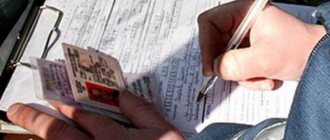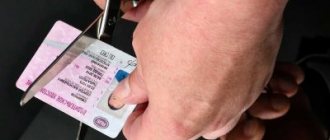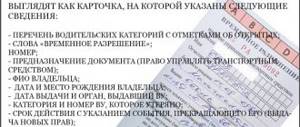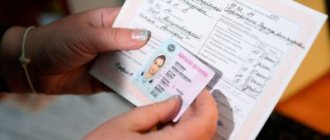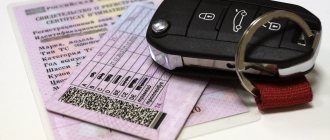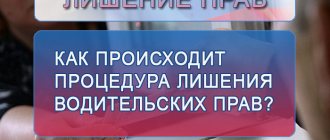The material was checked by the Expert: Kochergin Yuri Alekseevich
General Director of the Legal Support Center. Judicial experience in various disputes: 13 years. Education: AIE (f) SPbAUE.
Knowing a few tricks, you can really avoid deprivation of your license for driving while intoxicated. Moreover, based on the law, it is realistic to make the traffic inspector, and not the drunk driver, the offender.
Driving while intoxicated is punishable by a fine of 30,000 rubles or deprivation of rights for a period of 1.5 - 2 years, and the time period applies only to the first time; in case of a repeated offense, the ban on driving is 3 years. How to avoid deprivation of rights for alcohol in court is not precisely spelled out in the law, however, the notes of Article 12.8 of the Code of Administrative Offenses of the Russian Federation state: “... liability <...> occurs in the event of an established fact of use of substances that cause alcohol intoxication...”. This means that it is possible to protect yourself from punishment if you refute the fact confirming the specified violation.
Attention!
It is an administrative offense not only to drive a vehicle while intoxicated, but also to transfer control of the vehicle to a person who is intoxicated.
A traffic police officer does not have the authority to take away a driver’s license, since removal from driving a vehicle is carried out only by judicial procedure. The inspector may require documents to be submitted to the court.
Is it possible to avoid deprivation of rights?
Without legal assistance, it will not be possible to avoid deprivation of rights for alcohol intoxication, since, as already mentioned, the legislation does not have clear recommendations regarding this issue. A lawyer specializing in drunk driving cases knows quick and correct solutions. It is almost impossible for an incompetent person to independently understand the hidden implications of the law.
If the court has already made a decision to deprive a driver’s license due to alcohol intoxication, you can file an appeal.
On a note!
Court decisions of the first instance are subject to appeal only. The decision of the Court of Appeal is not disputed.
When it is impossible to avoid imprisonment for intoxication
It is impossible to prevent punishment if the offender fails to appear in court to appeal the charge of driving under the influence of alcohol. The decision to revoke a driver's license comes into force 10 days from the date of the verdict. The deadlines can be restored only if there is a good reason:
- disaster;
- unconscious state.
Services of lawyers for deprivation of driver's licenses in Moscow
You can contact the services of a qualified Yudu specialist when:
- Need information on driver protection issues
- Witnesses need to be interviewed
- It is required to defend an opinion on illegal deprivation of rights in Moscow
Lawyers involved in the consideration of cases of confiscation of driver's licenses will identify shortcomings made by traffic police officers or medical experts when drawing up an administrative protocol.
It often takes up to 2 months for a court verdict when considering these cases. During this period, the deprivation of rights lawyer will collect all the necessary data to refute the decision.
The Right Action
It is necessary to behave in a conversation with a traffic police officer by adhering to the following recommendations:
- do not refuse to take an alcohol test. If the driver is truly intoxicated (even slightly), then you should not seek testing at a medical institution in order to avoid punishment (deprivation of rights or a fine). After a medical report, it is possible to register with a diagnosis of chronic alcoholism, but here there are more serious restrictions;
- Do not count on leniency from the state traffic inspector. A sincere confession of taking alcohol will only confirm the suspicions of a law enforcement official;
- carefully read each point of the compiled protocol. If the driver makes no comments, then this confirms the fact of his guilt, which is problematic to refute at a court hearing.
On a note!
The driver has the right to record a conversation with a law enforcement officer on camera.
Medical examination
Reasons for referral to a medical institution are required, namely:
- driver's refusal to take a breathalyzer on the road;
- the traffic inspector disagrees with the results of the alcohol test;
- the driver disagrees with the received data.
The traffic police officer undertakes to draw up a “protocol of referral for a medical examination.” At this moment, a video recording is made, and witnesses are also present. After drawing up the protocol, in accordance with clause 6.9 of Order No. 664, the inspector must personally take the offender to a medical examination, where a test for alcohol and drugs is carried out. A medical examination involves taking exhaled air (clause 231 of the same order). It is possible that urine and blood tests will be performed, which are placed in special flasks and sealed.
If the medical examination did not reveal the presence of artificial stimulants in the body, which is confirmed by the examination report, then the driver managed to avoid deprivation of his license without legal assistance. It is important to know that, based on clauses 233 and 240 of Order No. 664, the driver must be sent “... to the place of suspension from driving a vehicle or to the location of his vehicle...”.
Protocol on administrative violation
A protocol on removal from driving a vehicle is drawn up after a medical examination. It is important to double-check all data in the document for compliance:
- addresses where the offense was recorded;
- the vehicle driven by the driver;
- witnesses included in the protocol and other aspects.
The procedure for re-obtaining a driver's license after the end of the punishment for drunkenness
If the driver was nevertheless deprived of his driving license, then after the expiration of the period of deprivation he has the opportunity to restore it. To do this, you need to contact the traffic police department, and specifically the same one where he previously received his certificate. The driver will be sent to a special medical commission, where his sanity will be checked, as well as his current knowledge of the Rules of the Road.
There is no other way to restore your driver's license. When a driver is detained with an excess level of alcohol in his body, the inspector will necessarily draw up a Protocol on the driver’s removal from driving a vehicle. It, like the examination report, will describe all evidence of the violation, including the results of a breathalyzer measurement or a medical report.
We invite you to familiarize yourself with: Surgut lawyer for consumer rights protection
Next, the protocol will be submitted to the court, and depending on the situation, the driver will be deprived of his driving license for a certain period, but at least for a year and a half (and then for the first such violation). Therefore, you should not drink alcohol at all, and if you do drink, you should not drive. Deprivation of a license and a fine for drunkenness are only minor punishments compared to the possible disaster that a drunk person driving a car can cause.
The driver is required to get out of the car and provide documents for the car if required by the traffic police. The driver may not sign the protocols or acts if false information is indicated there or if he doubts the reliability of the examination results.
Refusal to undergo examination is regarded as an automatic admission of guilt. Therefore, there is no need to aggravate the tense situation. A refusal would be appropriate if, having asked for documents for a breathalyzer, the inspector did not provide them or a used disposable tube was inserted.
Important: before signing the act, you must insist on a second measurement of alcohol concentration. Sometimes traffic police officers enter the same data or ignore the second measurement.
The driver can hope to have the case closed if:
- serious errors were made in the protocol or inspection report;
- the testimony of witnesses and the inspector does not coincide;
- the testimony of the protocol and the inspection report differ from each other;
- the documents do not contain contact information or signatures of witnesses;
- the inspector and the witnesses turned out to be acquaintances;
- the laboratory where the examination was carried out does not have a license.
Thus, the person who handed over control to a drunk receives exactly the same punishment as the driver himself while intoxicated.
1. For transferring control to a person in a state of intoxication, not only the owner of the car, but also another driver who directly transferred control to the drunk can be punished.
For example, the car belongs to Alexander. Alexander transferred control of the car to his son Boris by proxy. Boris handed over control to his friend Vadim, who was intoxicated.
In this case, it is not Alexander, who owns the car, who should be punished for transferring control, but Boris, who directly transferred control to the drunken Vadim.
2. The fact that control was transferred to a drunk driver must be proven by an official.
For example, if a drunk driver independently took the car keys from the shelf, and the owner of the car did not even suspect it, then no punishment should be imposed.
What can you do before the court to protect yourself from deprivation?
After the traffic inspector has drawn up and sent the report to the court, which takes 15 days to review, then the date for the hearing is specified. If the offender has not received a summons to court, this does not mean that the meeting will not be held and the driver will not face deprivation of his license for alcohol intoxication. In order not to miss the deadlines for the trial, you must independently find out the date of the trial, otherwise it will become impossible to challenge the offense and avoid punishment. Information about lawsuits related to road accidents is posted on the website of the State Traffic Inspectorate, where you must enter data from your driver’s license.
What to ask the court for if a medical examination took place
- witness statements, if any;
- a copy of the medical institution’s license;
- a list of employees who are obliged to store containers with tests, as well as a petition to invite these persons to court;
- order of the head physician for permission to collect blood (if such a procedure was performed) by a health worker;
- admission of the physician who conducted the examination;
- documents on sealing flasks with urine and blood.
What to apply for if you were only tested for alcohol on the road
To prove your case and avoid punishment in the form of deprivation of your license due to driving while intoxicated, you should request permission to:
- obtaining testimony from witnesses from the driver's side;
- calling a traffic inspector who conducted a breathalyzer;
- calling witnesses who participated in the examination;
- attaching video recordings to materials if the driver filmed a conversation with traffic inspectors;
- documents for the device used to test alcohol concentration.
How to challenge a decision of the court of first instance
The violator has 10 days from the date of receipt of the corresponding letter to file an appeal to a higher court. Valid reasons for missing this deadline may be the reason for its extension.
The document contains a request to cancel the decision of the court of first instance on the following grounds:
- the person against whom the proceedings were conducted was not properly informed of the time, date and place of the court hearing;
- the person was informed about the meeting, but missed it for a valid reason;
- the presence of serious evidence of procedural violations committed during the proceedings;
- the emergence of new arguments in one's defense.
The complaint is addressed to a superior judge, but is filed in the court of first instance. In case of refusal to cancel the decision, there is also a court of cassation. If the decision of the first court is overturned, you can go to the traffic police with a supporting document and return the certificate.
How to avoid being disqualified for drunkenness
Article 1.5 of the Code of Administrative Offenses provides for a number of aspects that constitute serious grounds for doubt regarding the reliability of the established fact of driving a vehicle under the influence of alcohol.
If the roadside inspection procedure itself is violated
It is quite possible to avoid deprivation of a driver’s license in court if:
- the disk with records of the fact from the inspection site is unreadable or lost by the patrol officers;
- signatures of witnesses in documents differ;
- the time of examination is not recorded or does not match in the protocols;
- incorrect sequence of examination;
- the alcohol concentration is not written in mg/l, but is presented in other values;
- incorrect interval between inhaled air samples (15 - 20 minutes), which does not correspond to the entries in the receipts.
Breathalyzer violations on the road
- lack of printed tester results;
- air temperature or weather conditions are unsuitable for testing with the device;
- Data about the driver and the device, as well as the time and date of the test, are not recorded. The instrument inspection date does not have to be hand-written;
- non-compliance of the device certificate with state standards No. 50444-92;
- lack of signature on the verification document;
- the breathalyzer is not registered as a medical device;
- the seal on the tester is broken or missing;
- time checks are no longer relevant;
- the analysis was carried out by a non-accredited organization.
Violations during medical examination
- the driver was sent to a medical facility without a preliminary breathalyzer test;
- after collecting exhaled air, no urine or blood analysis was carried out or, conversely, blood and urine were tested without collecting air;
- there is no doctor’s signature on the medical examination report;
- the laboratory has an expired or missing license;
- the test took place in a mobile laboratory;
- the doctor does not have a certificate of completion of training.
Statute of limitations for cases of deprivation of a driver's license
Drinking alcohol while driving is prohibited.
The Code of Administrative Offenses provides for a statute of limitations. It is used in cases where, for some reason, a traffic police officer did not timely transfer the completed protocol to the magistrate.
This may happen due to an accidental error or due to the fact that the offense occurred too long ago and has only ceased to be a secret now.
Article 4.5 of the Code of Administrative Offenses provides that the statute of limitations is 1 year. The offender may be tempted to “play out time,” but this is almost impossible to do. Such attempts will most likely lead to the fact that the court hearing will take place without the participation of the offender, and this significantly reduces his chances of receiving a reduced sentence.
Can a lawyer help me?
Undoubtedly, a lawyer or other person acting as a defense lawyer in court will provide support. How high the likelihood of losing your license due to alcohol intoxication is depends on the specific situation. However, with competent legal support, the risks of being removed from driving are significantly reduced.
It is also recommended that you familiarize yourself with the table indicating the penalties:
| Name of the legislative act | Type of violation | Punishment |
| clause 3 art. 12.27 | Driving a vehicle under the influence of alcohol or drugs without consequences related to the Criminal Code. | Removal from management for 1.5 - 2 years. Fine – 30,000 rubles. |
| clause 1 art. 12.26 | Refusal of medical examination. | |
| clause 2 art. 12.8 | Transferring control of a vehicle to a person under the influence of alcohol. |

